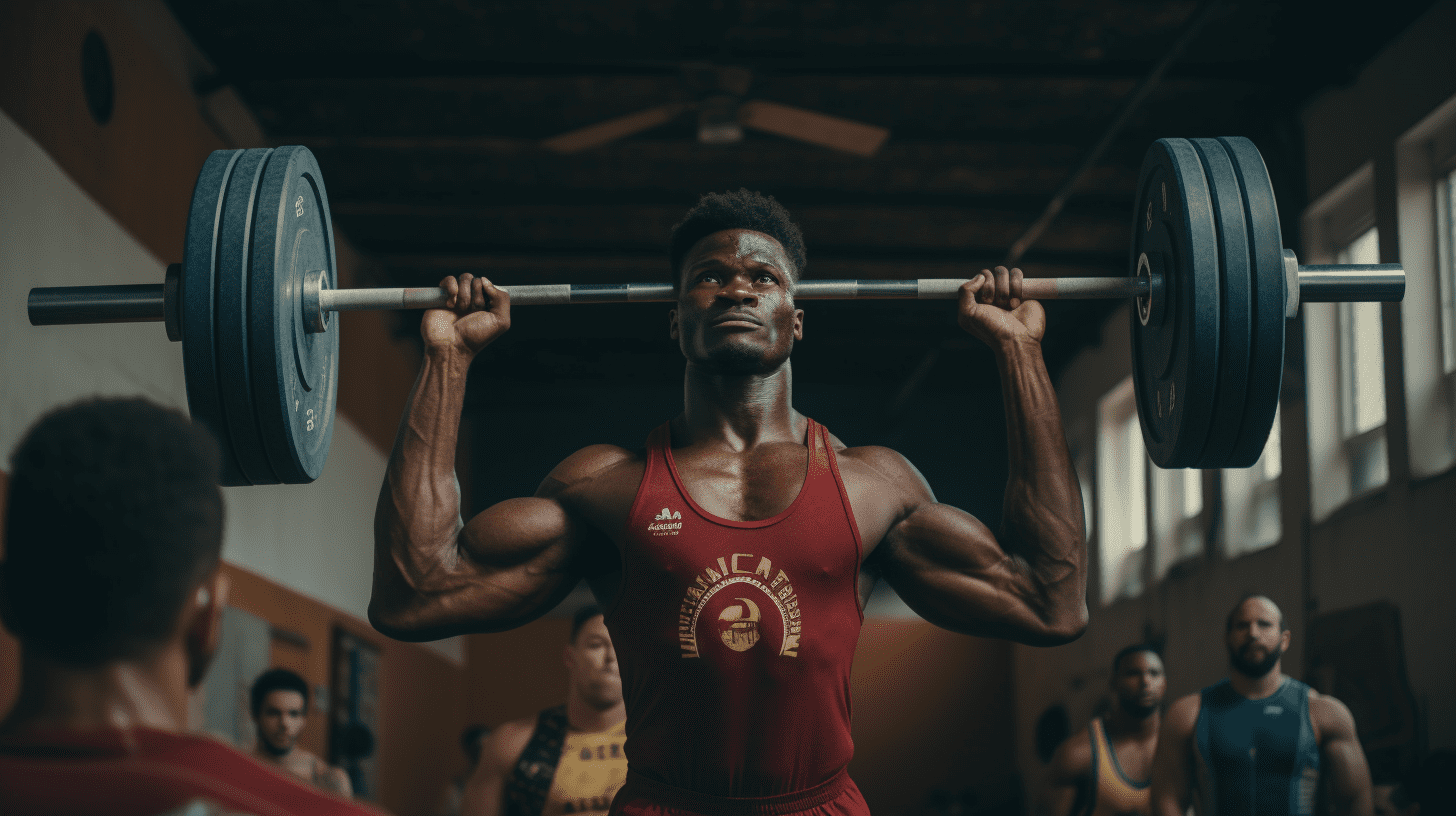- Home
- Wiki
- Betting Strategies
- Lifting the Odds: A Guide to Weightlifting Betting
Lifting the Odds: A Guide to Weightlifting Betting
Weightlifting is one of the most venerable sports globally, with prestigious events drawing immense spectator interest. This spectatorship naturally segues into ample betting opportunities, allowing for substantial wagering on these illustrious competitions.

Even as a novice to weightlifting, navigating the betting landscape is an achievable feat. This comprehensive guide is curated to seamlessly guide you through the intricacies of weightlifting competitions, ensuring a fortified understanding of the sport's nuances, and adeptly preparing you for a successful betting experience.
Fundamentals of Weightlifting
At a glance, weightlifting might seem straightforward – a plain quest to discern who can lift the heaviest weight. Yet, delving deeper into the sport reveals layers of complexity and nuance vital for anyone considering placing a bet.
Commonly referred to as Olympic weightlifting, this sport operates under a specific set of rules, defined by the International Weightlifting Federation, encompassing various types of lifts. Despite the multitude of rules, a comprehensive understanding of all is not a prerequisite for betting, but basic knowledge is crucial.
Deciphering the Categories
Men's competitions feature eight bodyweight categories, spanning from 56kg to 105+kg, while the women’s competition includes seven, ranging from 48kg to 75+kg. Each competition is divided into two principal events: the Snatch and the Clean and Jerk (C&J), with three attempts allotted for each lift. The heaviest weight successfully lifted in each event is combined to form the ‘Total,’ with the highest total determining the overall winner. Some competitions also recognise individual lift achievements.

Understanding the Events
Snatch
A singular, swift motion lifted the bar from the floor to arms’ length overhead.
Men lift in excess of 210kg; women frequently surpass 140kg.
Clean and Jerk (C&J)
A two-motion lift moves the barbell overhead.
The 'clean' moves the bar to the shoulders, followed by the 'jerk' lifting it overhead.
Men's lifts can exceed 260kg, and women's often top 180kg.
Each successful lift is acknowledged by referees, contributing to the athlete's total score. The accumulation of the heaviest lifts from each event determines the overall champion. In a tie, the competitor with the lower body weight is declared the winner.
Betting Opportunities
Betting avenues in weightlifting are abundant. Beyond the quadrennial Olympic Games, you can wager on the annual IWF Weightlifting World Championships and the Youth World Championships, each generating substantial betting interest.
In essence, unravelling the intricacies of weightlifting competitions and understanding the key elements is vital for making informed betting decisions, augmenting your chances of a rewarding betting experience. As you embark on your betting journey in the world of weightlifting, ensure you’re equipped with the essential knowledge and insights to navigate the betting landscape proficiently.

Betting on Weightlifting
Navigating the world of weightlifting betting is remarkably straightforward, mirroring the sport's simplicity. The relatively few betting markets available simplify the learning curve for bettors. Below is a concise breakdown of the principal types of weightlifting bets to enhance your understanding and streamline your betting journey:
Winner
Description: Choose the athlete predicted to win the competition.
Outcome: Win the bet if the selected athlete emerges victorious.
Head-to-Head Bet
Description: Select between two paired weightlifters, predicting who will outperform the other.
Outcome: Win if the chosen weightlifter ranks higher than their paired competitor, irrespective of their overall ranking.
Bets on Top 3
Description: Predict the three weightlifters to finish in the top three, without specifying the order.
Outcome: A correct prediction leads to a substantial payout, given the generous odds typically offered in this market.
Handicap Betting
Description: Aimed at levelling the playing field by assigning a handicap to the favoured athlete.
Example: Athlete A -3.5kg, Athlete B +3.5kg. A bet on Athlete A wins if they remain the winner even after a 3.5kg deduction from their total.
Outcome: Win by making accurate predictions, taking the handicap into account.
Over/Under
Description: Bet on the total weight lifted by an athlete to be over or under a specified value.
Example: Over/Under 200kg.
Outcome: Win by accurately predicting whether the actual total will be over or under the set value.
Outright Bets
Description: Place bets on various possible outcomes before a major event.
Example: Bet on which countries will secure medals or the specific medal count for each country at the Olympic Games.
Outcome: Explore diverse betting options for potential wins based on accurate predictions.
Live Betting
Description: Real-time betting during weightlifting competitions.
Outcome: Capitalize on dynamic odds and potentially spot lucrative opportunities based on real-time competition developments.

What to Consider When Betting on Weightlifting
Success in weightlifting betting pivots fundamentally on meticulous research. While certainty in betting remains elusive, comprehensive knowledge considerably bolsters your winning chances. Long-term weightlifting enthusiasts likely possess abundant insight into athletes, providing a substantial betting advantage. Nonetheless, for novices, the expansive online world offers a wealth of information.
Key Areas to Investigate
- Participant Statistics:
Task: Examine athletes’ recent performance trajectories and potential progress or decline.
Resource: Online databases and sports websites. - Psychological State and Goals:
Task: Probe into athletes' mindset and objectives.
Resource: Social media platforms often unveil crucial insights into athletes' mental states and aspirations. - Training Insights:
Task: Investigate training routines and lifting records.
Resource: Athletes' social media channels often document their training journey and achievements. - Injury History:
Task: Scrutinize athletes’ injury records and recovery patterns.
Resource: Official and credible sports news websites.
Tip: Rapid return post-injury might signal incomplete recovery, potentially impacting performance. - Competition Significance:
Task: Assess the competition's importance to understand athletes’ potential performance strategies.
Tip: Big names in minor competitions might prioritise preparation over victory, potentially affecting outcomes.
Evaluating Major Events:
For premier events like the Olympic Games, assume athletes' peak form. However, consider the substantial pressure and its potential performance implications. Comprehensive athlete understanding, derived from diligent research, substantiates more informed and strategic bets.
Pros and Cons of Weightlifting Betting
Betting on weightlifting, like any other form of sports betting, carries its own unique set of advantages and drawbacks. Understanding these aspects can help potential bettors make informed decisions. Below is a comprehensive look into the pros and cons of weightlifting betting:
Pros
- Simplicity: Weightlifting is straightforward to understand, making it easier for beginners to grasp betting concepts and strategies related to the sport.
- Limited Betting Markets: Fewer betting markets mean bettors can master the available options faster, allowing for more informed betting decisions.
- Potential for High Returns: Certain betting markets, such as bets on the top three finishers, offer generous odds and the opportunity for substantial payouts.
- Availability of Information: Many online resources and social media platforms provide insights into athletes’ performances, training, and mental states, aiding in more informed betting decisions.
- Excitement: Live betting offers real-time excitement, allowing bettors to make decisions based on the unfolding events.
Cons
- Limited Betting Opportunities: Major weightlifting competitions occur infrequently, providing fewer opportunities for betting compared to other sports.
- Injury Risks: Athletes may sustain injuries that can impact the outcome of bets unpredictably.
- Influence of Subjective Judging: Referees’ decisions play a crucial role in determining the outcome, which can sometimes be subjective and lead to unexpected results.
- Potential Lack of Competitive Edge: Smaller competitions may see top athletes not performing to their full potential, making it harder to predict outcomes.
- Less Mainstream: Given its niche status, weightlifting might have less coverage and betting options compared to more popular sports, limiting the breadth of betting opportunities.
Conclusion
In sum, while weightlifting betting offers simplicity, the potential for high returns, and abundant information for making informed bets, it also presents challenges such as limited betting opportunities, injury risks, and the influence of subjective judging. Balancing these aspects and conducting thorough research is essential for individuals looking to navigate the world of weightlifting betting successfully.
FAQ
Yes, weightlifting betting is generally straightforward, even for beginners. The sport itself is easy to grasp, and the limited betting markets mean new bettors can quickly learn and make informed bets.
Conduct thorough research on the athletes and the competitions. Investigate participants’ statistics, recent performances, mental states, training insights, and injury histories. Utilizing online resources and social media platforms can yield valuable information for making informed bets.
Yes, weightlifting betting includes various types such as Winner, Head-to-Head bets, Bets on Top 3, Handicap Betting, Over/Under bets, Outright Bets, and Live Betting. Each type offers unique opportunities and challenges.
Returns can be significant, especially in certain betting markets like Bets on Top 3, which often offer generous odds. Precise knowledge and timing can lead to substantial payouts.
Betting opportunities are relatively limited compared to other sports as major weightlifting competitions, like the Olympic Games or World Championships, occur infrequently. However, various smaller competitions can also provide betting opportunities.
An athlete’s injury history is crucial in betting. An injured athlete or one returning to competition post-injury may not perform optimally, potentially affecting the bet’s outcome. Detailed insight into injury history and recovery is essential for making informed betting decisions.
Yes, live betting allows you to bet on competitions in real-time, offering the opportunity to make decisions based on the events as they unfold, and potentially spotting lucrative opportunities.

Comments0